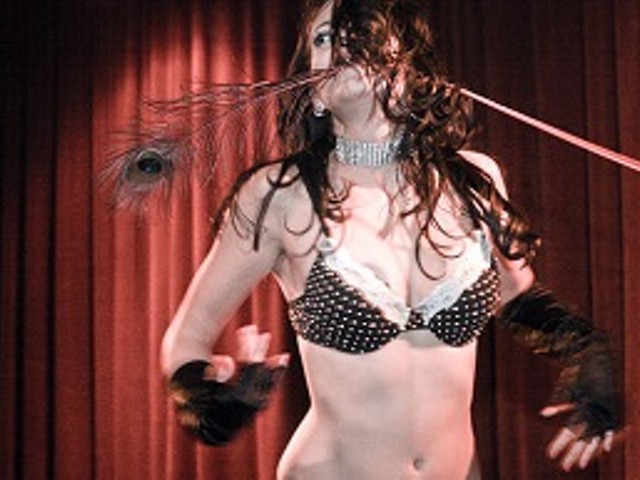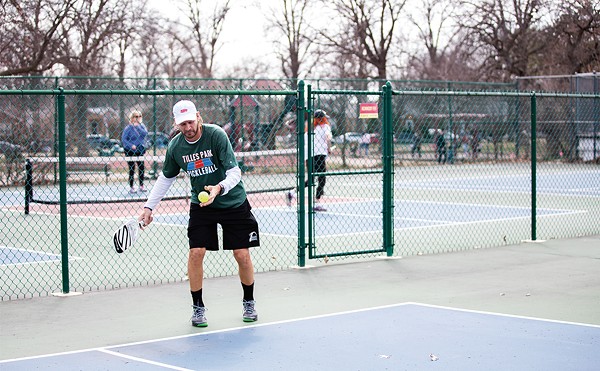A string quartet, says Elliot, a brainy and machinating violinist, is a "discourse among four reasonable people." The musician is quoting Johann Wolfgang von Goethe to describe the inner workings of the Lazara Quartet, his own ensemble of violins, viola and cello.
Whatever you say, Johann.
A better formulation comes by way of Dorian, the quartet's brilliant but erratic violist, who describes the foursome, at its best, as being like a "living, pulsing organism copulating with itself," and at its worst as being akin to "swallowing Drano." Both forms of pipe cleaning (and a few more) abound in Michael Hollinger's Opus, an engrossing drama that opened last Friday at the Repertory Theatre of St. Louis.
Certainly, polyamorous self-stimulation and chemical clog removers hardly seem like the stuff of great theater — particularly in connection with the ostensibly staid world of chamber music. But in the capable hands of director Brendon Fox, these warring musical visions take on a visceral immediacy as five high-strung musicians struggle to maintain their exacting standards as their famed quartet unravels before them.
"But wait," you say. "Five musicians...in a quartet?"
And therein lies the rub. At its most basic Opus is a play of musical chairs, with five musicians vying to fill the group's four seats. At its most complex, however, the play affords an insider's view of the emotional and professional toil that ambitious musicians must undergo to create works of ephemeral beauty. It is a play that, despite its melodramatic finale, bristles with subtle insight into the complicated relationship between musicians and their work. Hollinger trained as a violist before moving on to theater, and, remarkably, some of the play's most riveting scenes involve conflicts over, wait for it...sheet music.
As the play opens, Grace (Rachael Jenison), fresh from conservatory, auditions with the remaining members of the celebrated Lazara Quartet for the role of violist, a position recently vacated by Dorian (Matthew Boston). Grace has the chops, but she wins the job on the spot because the group is on deadline: It is slated to play the White House in less than two weeks.
Alternating between scenes rehearsing for the big night and flashbacks to the events that precipitated Dorian's expulsion, we learn that although the group fancies itself a radical democracy, it is the urbane and manipulative Elliot (James Joseph O'Neil) who really calls the shots. Austere and technically proficient, Elliot plays Apollo to Dorian's virtuosic but unstable Dionysus. Rounding out the group is the jolly and philandering second violin, Alan (Greg Jackson), and Carl (Chris Hietikko), the cellist and family man who we learn midway through the play is also fighting cancer.
Dorian may channel Mozart when he plays, but he's also given to emotional outbursts, once breaking Alan's bow when he found the violinist's performance wanting. ("Not his good bow!") Complicating matters, Dorian and Eliot were lovers, and although Dorian is the more gifted violinist, Elliot controls his emotionally needy mate by withholding affection and keeps an uneasy peace by relegating him to the viola, a supporting instrument that "flattens him out" — just like the lithium he dumps down the toilet following his ouster. Making matters yet more precarious, Dorian has disappeared. He's off his meds and off the grid, adding a touch of menace as the quartet rehearses for its big gig.
Working on a spare but effective set designed by James Kronzer, the cast delivers nuanced, singular performances, aptly "playing" their instruments to the prerecorded strains of Beethoven, Bach and Bartók. The WASPish O'Neil and the avuncular yet lecherous Jackson are particularly strong. Jenison and Boston also deliver solid performances, though they occasionally stray toward that gray land of generalized caricature — a skipping and wide-eyed enthusiasm for Grace, an at times overly broad queenishness for Dorian.
Hietikko ably comports himself as the stable cellist whose brush with mortality has taught him to avoid the scrum, but there's no denying it: Carl's battle with cancer seems ornamental. Indeed, this plot bauble remains decorative through the play's penultimate scene, as the musicians — their futures fraught with peril and promise — exit the White House greenroom for the performance of a lifetime.
Lights...
But wait! There's more. The musicians may not be called back for a presidential encore, but the actors return to the stage for the night's bewildering and explosive final scene — a sort of Pete Townshend meets Yo-Yo Ma mash-up. It may be emotionally satisfying. It may even explain the mystifying introduction of Carl's cancer, but the overwrought ending threatens to void the play's nuanced tangle of art and emotion, not unlike a dram of liquid Drano.






